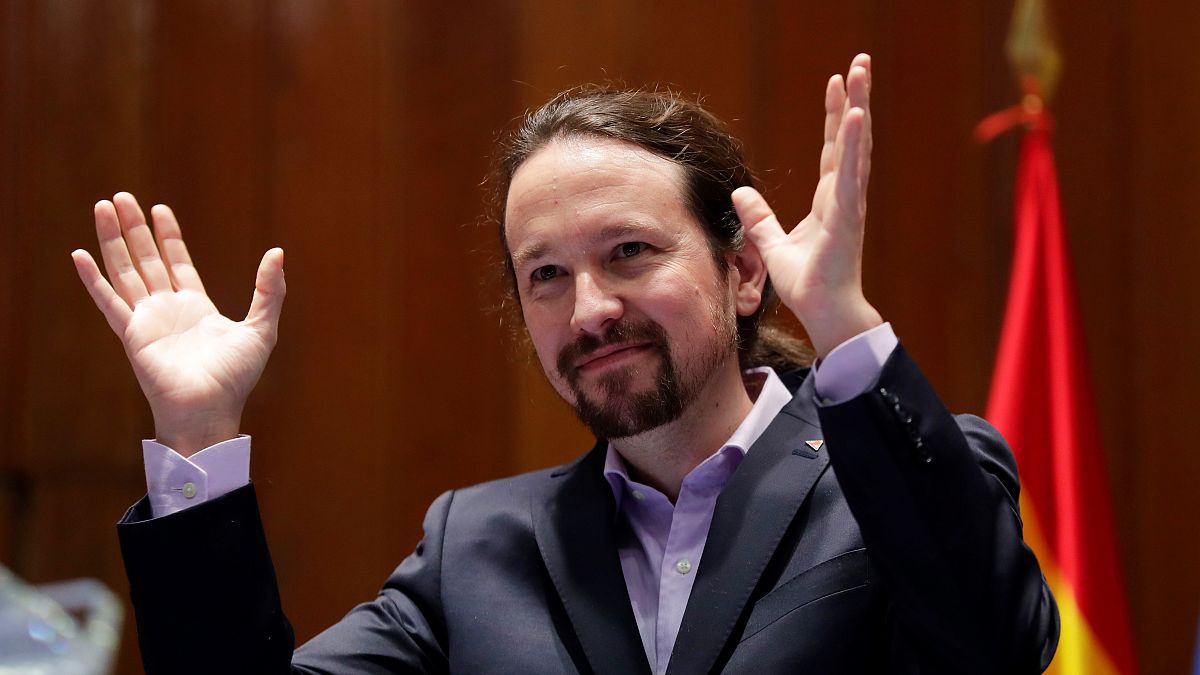Pablo Iglesias, the leader and founder of left-wing party Podemos, resigned from party politics following defeat in the regional elections in Madrid.
“I resign from all my functions, leaving politics in the sense of party politics, of institutional politics,” declared Pablo Iglesias on Tuesday night, after his party was soundly defeated by the conservative Popular Party in the Madrid regional elections.
The leader and founder of Podemos said he was stepping aside so he wasn’t “an obstacle to the renewal of leadership” the leftist party required.
In less than ten years, Iglesias has experienced a series of victories and defeats, bringing a style of politics previously unknown to Spain, or indeed Europe.
The leader and founder of Podemos has experienced, in less than ten years, a series of victories and defeats, bringing a style of politics previously unknown to Spain, or indeed Europe.
With his trademark ponytail, the former political science professor became one of the fixtures of Spanish politics following the formation of the left-wing Podemos (meaning ‘we can’) in 2014.
Podemos was heir to the Indignados movement and the massive anti-austerity protests that took to the streets in 2011.
Iglesias and his party achieved what appeared impossible: to enter the European Parliament in 2014, just months after registering as a party, with five MEPs. This made them the fourth largest Spanish political force.
Those who viewed him initially as an alien to the world of institutional politics, quickly began to take Iglesias seriously as a political force to be reckoned with.
He joined the Spanish government in January 2020, as second vice president in the administration of prime minister Pedro Sánchez and his Socialists.
But in March he made the surprise decision to renounce his position, and stand in the local elections in Madrid, attempting to save Podemos in one of its bastions.
But he lost the battle. Despite his presence - or perhaps because of the animosity he aroused in many of his detractors - the leftist parties did not manage to defeat the right wing, which has enjoyed 26 years of power in the region.
The defeat marked the end of his political career, as he passes the baton of leadership on to the party’s labour minister, Yolanda Díaz.
“When you are no longer useful, you have to know to retire”, he said as Podemos fell behind Mas Madrid, a rival party on the left.
A fighter from the start
Politics has always run through the veins of Pablo Iglesias, who was born in Madrid in 1978 and baptised by his parents in honour of another Pabloc Iglesias - the founder of the Partido Socialista Obrero Español (PSOE) in the 19th century.
The son of a lawyer and a labour inspector, who was jailed during the fascist dictatorship of Francisco Franco, Iglesias joined the young communists at the age of 14.
This early activism sparked in him an interest in the anti-globalisation movements and the new forms of socialism finding success in Latin America.
During his academic career, Iglesias obtained a Law degree, a Master’s in Communication, and a PhD in Political Science.
He taught classes at the Universidad Complutense de Madrid, where he met those who would become the founding team of Podemos.
The “assault” on the the European Parliament and Spanish government
With their fists raised and with shouts of “yes we can”, Iglesias and his colleagues entered the European Parliament in 2014 and 2015, together with the liberal Ciudadanos, thus ending the bipartisan domination of the Spanish Socialists and Conservatives.
Furiously denouncing austerity and corruption of the political “caste”, and the economy, Podemos became the third largest political force in Spain.
The party’s dream to overtake the Socialists as the representatives of the left failed.
But finally the two sides arrived at an agreement to defeat the Conservative Mariano Rajoy in 2018 and form the first coalition government the country had seen since the end of the Franco dictatorship.
In government he made the blocking of rents or the repeal of a conservative reform of the labour market his main battle horses.
Many of the social measures approved by Pedro Sánchez's government have been negotiated hard by Podemos.
The charismatic Iglesias, who excels in TV debates, has been the soul of the party from the start, so much so that his face appeared on ballot papers for the 2014 European elections.
Mansion with a pool
The purchase of a €600,000 villa with a swimming pool on the outskirts of the capital caused a stir in the party.
Iglesias lives there with his partner - the current government Equality Minister Irene Montero - and their three children.
He is passionate and sincere to his supporters, and demagogic to his detractors, many of whom are on the right wing of politics, who point to his links to Venezuela.
He has long been compared to the former prime minister of Greece, Alexis Tsipras, who led the leftist Syriza party in government from 2015 to 2019.
In any case, Iglesias's brief tenure has marked Spanish politics with the end of the traditional two-party system and has become proof that another way of doing politics is possible.


